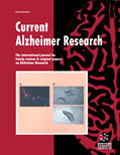To find the most relevant journal, please insert appropriate keyword to facilitate search.
Search Results: car

Current Alzheimer Research
ISSN: 1567-2050 (Print)
eISSN: 1875-5828 (Online)
Special Issues With Active Call for Papers
Perspectives and Dynamic Predictive Factors Related to Mild Cognitive Impairment (MCI) and Alzheimer’s Disease (AD) or Conversion from MCI to AD
Cognitive decline, especially Alzheimer’s disease (AD), is neurodegenerative disorders characterized by the cerebral accumulation of amyloid beta (Aβ) and tau and other proposed pathophysiologies. Mild cognitive impairment (MCI) and AD impair the quality of life of the elderly and pose huge public health burdens to the society. The development of MCI and AD are a consequence of the interaction of genetic and environmental factors including ApoE4 and other genetic risk factors, lifestyle, education level, metabolic... see more
Alzheimer's Disease Drug Development
Alzheimer's disease is a progressive neurodegenerative disorder that affects millions of people worldwide. Despite decades of research, no cure or disease-modifying treatment is available yet. Therefore, the need for developing effective therapies to treat Alzheimer's disease is an urgent matter. This special issue aims to provide a comprehensive overview of the current state of Alzheimer's disease drug development, identify the challenges, and propose future directions for drug discovery and development. We hope that this collection... see more
Current updates on the Role of Neuroinflammation in Neurodegenerative Disorders
Neuroinflammation is an invariable hallmark of chronic and acute neurodegenerative disorders and has long been considered a potential drug target for Alzheimer’s disease (AD) and dementia. Significant evidence of inflammatory processes as a feature of AD is provided by the presence of inflammatory markers in plasma, CSF and postmortem brain tissue of AD patients and also is found across AD animal models. Neuroinflammation has also been shown across different phases of AD pathology. Indeed, from... see more
Deep Learning for Advancing Alzheimer's Disease Research
Alzheimer's disease (AD) poses a significant global health challenge, with an increasing number of individuals affected yearly. Deep learning, a subfield of artificial intelligence, has shown immense potential in various domains, including healthcare. This thematic issue of Current Alzheimer Research explores the application of deep learning techniques in advancing our understanding of AD, enabling early diagnosis, predicting disease progression, and developing innovative therapeutic interventions. Authors are invited to submit their original research or review articles... see more
Machine learning in neuroimaging of Dementia and normal aging
Application of Artificial Intelligence (AI) in medical imaging has significantly transformed the field of medical diagnostics, enabling faster and more accurate analyses. This Special Issue aims to gather groundbreaking research and innovative applications that leverage AI to advance medical imaging analysis in the field of dementia and normal aging. We welcome submissions exploring topics on AI classification of dementia subtypes AI prediction of AD conversion and dementia disease progression AI MRI of... see more
New Advances in the Prevention, Diagnosis, Treatment, and Rehabilitation of Alzheimer's Disease
Aims and Scope: Introduction: Alzheimer's disease (AD) poses a significant global health challenge, with an increasing prevalence that demands concerted efforts to advance our understanding and strategies for prevention, diagnosis, treatment, and rehabilitation. This thematic issue aims to bring together cutting-edge research and innovative approaches from multidisciplinary perspectives to address the complex challenges posed by Alzheimer's disease. Aims: . Explore Emerging Preventive Measures: Investigate novel strategies and interventions aimed at preventing or delaying the onset... see more
Linear and non-linear Signals from the brain: from basic to clinical application
Neurodegenerative diseases are increasing in the general population and have been defined by the World Health Organization (WHO) and Alzheimer's Disease International (ADI) as a global public health priority. Data from the WHO Global Action Plan 2017-2025 indicates that in 2015, neurodegeneration-related diseases affected 47 million people worldwide, a figure expected to increase to 75 million by 2030 and 132 million by 2050, with approximately 10 million new cases per year (1 every 3 seconds).... see more
Virtual reality-based interventions for cognitive rehabilitation in Alzheimer’s disease
Virtual reality (VR) has been a widely used tool for the rehabilitation of patients in the last two decades, both in the motor and cognitive aspects. VR-based applications are a form of non-pharmacological therapy that has proven effective as an adjuvant treatment. VR has also been shown to be a tool that can improve the quality of life and well-being of people with dementia. Although great progress has been made in the motor aspect, there... see more
Leading Alzheimer Disease Prevention with Precision Health Strategies.
The rising numbers of patients with Alzheimer’s disease (AD) is a concerning reality in our society. Despite tremendous public-private efforts, finding an appropriate treatment for Alzheimer’s disease prevention has not been successful. One of the reasons behind this failure is the push for finding “a treatment that fits all sizes” and ignoring the focus on “the right drug, the right dose, and the right people”. Notably, AD patients have several clinical comorbidities, such as diabetes,... see more
Diagnostic and therapeutic biomarkers of dementia
Dementia affects 18 million people worldwide. Dementia is a syndrome of symptoms caused by brain disease, usually chronic or progressive, clinically characterized by multiple impairments of higher cortical functions such as memory, thinking, orientation, and learning. In addition, in the course of dementia, cognitive deficits are observed, which often hinder professional activity, social functioning, and performing daily activities. The most common types of dementia are Alzheimer's disease (AD) and dementia with Lewy bodies (DLB). Vascular... see more